Share

Invisible Not Broken - Chronic Illness Podcast Network
EDS,MCA, POTS, Collect Them All: German Socialized Medicine, Medical Marijuana, UBER WE HAVE AN IDEA FOR YOU: Chronic Illness Serial Podcast
“I had always defined myself by my achievements ” — Karina
I have made choice of not doing just one or even two posts of a diagnosis (you might remember my interview). The reason is that each of us have a different experiance with our disorders and I want to show how wildly different stories can be even when they live under the same diagnosis. OK, off my soap box I have you really enjoy hear from Karina and hearing about her journey. You will learn so much from pain medication guilt, medical, marijuana, the niaviete before chronic illness, and I learned so much about socialized medicine in Germany and the differences with the ACA.
What is your disorder? *
Ehlers-Danlos Syndrome and comorbid conditions (spinal instabilities, mast cell activation, small fiber neuropathy, dysautonomia and others) - 15 diagnoses by now.
At what age did your disorder become a daily issue? *
24
Who were you before your illness became debilitating? *
I would say that I was really naive. I thought nothing could ever hurt me. In 2009, I just started my career as a lab technician, moved into my first apartment, and everything was just fine. I was self-confident and a perfectionist. Moreover, I had a 5-year-plan that included marrying, building a house, working for doctors without borders, adopting a child, and many more. Playing volleyball and other sports were my life - I was super competitive and ambitious, which I still am, but in a different way, and other areas.
What would you do if you were not dealing with your invisible illness? *
There is a lot I would do if I were not sick! For example, traveling around the world (parts of the world are just not accessible for me anymore), dancing, bungee jumping, weird sports I cannot do anymore, building up a lab in Africa, learning how to sail, hiking the pacific crest trail. Anyway, I would want to have the knowledge that I gained due to my illness with, because only now can I really appreciate all those things I had when I was healthy.
What would you like people to know about your daily life? *
…that I try very hard to be the best friend I can be. …that I feel horrible every time I have to say the words," I am sorry, I have to cancel." …that there is no such thing as a good day. There are better or worse days, but no more good ones. …that every day brings new challenges. …that even the smallest thing, such as taking a shower, can cause major symptoms. …that even though I might not be working a full-time job, I still am not sitting on my couch and stare holes into the wall. And if I do, it is not my choice, and absolutely not because I am lazy, but because it is the only way to get through the day. …that having a doctors appointment is pretty dramatic for me sometimes, because I made so many bad experiences, but still need my doctors. …that work that is not paid is still valuable and important. …that I do my best to achieve my goals, but the goals are sometimes maybe as simple as getting out of bed in the morning. …that I do not need any special treatment. I do not expect anything, and I do not set rules how I want to be treated. I do not feel offended by things like "I pray for you" or "Get better soon“. While I am not very religious, and most likely will not get better, I appreciate any good wish and thought.
What would make living and moving in the world easier for you? *
People that are more tolerant. Let me tell you a story. A couple of weeks ago, I went grocery shopping with my husband on a Sunday, like we always do. I cannot go by myself, because we do not own a car, so someone has to carry 30 pounds of groceries home. Going shopping is kind of a huge activity for me. By the time we finished, we had to take the metro home. It is only two stops, so I managed to stand during the whole time. I was wearing my neck brace, and that was the only obvious sign of my disability. A man standing next to me looked confused to me a couple of times until he said, "Hey, that must hurt, do you want me to ask someone here to get up?" He was pointing at the disability seats that were already taken. I was super surprised because nobody ever asked me anything like this in San Francisco. Usually, if I sit on those seats reserved for people with disabilities, people tend to give me bad looks when I do not get up for an old lady. But this time someone else asked me if I needed to sit down. If all people were like this guy, my life would be a lot easier. I was moved to tears by his gesture.
Do you have any life hacks? *
What I love most is my Aspen neck brace and my memory foam seat cushion. I am not going anywhere without those two. The latter one literally saves my ass. Other than that, I am sleeping with a u-shaped pregnancy pillow that supports all my joints. I like shoes that go over my ankles, to give me additional support when walking. Pants that sit tight help with proprioception, and compression stockings work well for dysautonomia and stability too. I use other braces for almost all of my joints; and a backpack with support around my hips, so not all the weight is on my back.
What kind of support do you get from family or friends? *
Luckily, I only lost a couple of important people. The majority is still with me. Some friends could not really deal with the "new“ me, and one relationship did not survive my changes. Becoming a butterfly that grows out of a rope is a huge transition, and some loved ones could take it better than others. To be fair, I was not easy to handle - especially in the beginning (2010). I had no idea who I was anymore, so how could other people know? My family and friends support me physically, for example drive me to appointments since I cannot drive by myself; they pick me up if we want to have a coffee together; and they also support me mentally if I had a bad appointment or just a very shitty day.
Would you care to relate the details of what happened when someone didn't believe you were disabled?
That is pretty typical. People tend to judge quickly based on appearance. Not sure why, because every one of us knows how to smile even if we do not feel like smiling. It is not so hard to see below this surface of "I am ok," and to recognize how the person really feels. But that would take some effort, and many people just do not want to get to know the real "me". It affected me in a very negative way. Sometimes I would not go outside even though I had a better day, because I worried that I would meet people that could assume that I am healthy. I felt like I was proving them right if I left my house and enjoyed the day. At some point I understood that this was just stupid. People assume whatever they want, and they will judge you anyway. It is a waste of your good moments if you do not go out and live your life when you can.
How has your invisible illness affected your relationships? *
I do not think that the invisibility of my condition in particular affected my relationship. My husband is very supportive and my ex broke up with me because we both could not handle my disease during that time. I do not think that anyone close to me has a problem with the invisibility of my illnesses. They know exactly how I feel as soon as they look into my eyes. It is mainly people I do not know that act weird around me. But of course being chronically ill affects any relationship. There are always things to consider, even for the smallest activity, and there is always a problem.
Is there anything you are afraid to tell even the people closest to you? *
I am somehow afraid to tell them that I feel very alone sometimes. They would feel as if I just told them they did not try hard enough to be there for me, but that is not it. The problem is more that, even though everyone is there for me, some days just suck so much that I just feel completely alone on this planet. Also, I am scared like hell to be all alone at some point of my illness, because I really do not know how to survive without the physical support of my family and friends. Another thing I should not even think, and of course not say, is that I am jealous of some of their perfect lives. Of course, they deserve to be happy, and I hate myself for feeling this way occasionally. But sometimes it just hurts to see how my friends can have families and normal lives.
What is your best coping mechanism? *
Writing! Whether I only write for myself, for example in a diary, or in public, I write every minute I feel ok. It became my passion and my sense in life.
What are you the most fearful of and hopeful for in the future? *
Fearful: I fear the moment when my disease will get to a point where I am unable to advocate for myself. Because without this ability, rare disease patients are completely lost. Hopeful: I think the EDS community is doing a great job in raising awareness, and this will hopefully lead to a broader understanding of our condition, more diagnosed patients and then more doctors to treat us.
What is your favorite swear word?
Oh gosh, many. :) I love to swear. Not so much in English, since it is not my first language. My favorite English words: Holy Shit, Fuck it, Holy Fuck. German: Verfickte Scheiße. I am a horrible person.
Learn More About Karina
You could add links to my websites, but I actually do not like to talk too much about my "achievements".
German/English Website and Facebook: Website: www.instabile-halswirbelsaeule.de Facebook: https://www.facebook.com/instabilehalswirbelsaeule German Blog http://www.holy-shit-i-am-sick.de Facebook: https://www.facebook.com/1000GeschichtenchronischkrankerMenschen
My personal story in two books
(German): My way to diagnosis:
More episodes
View all episodes
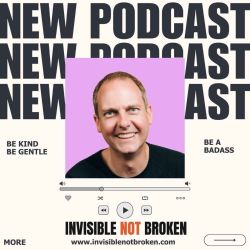
Vulnerability, Resiliency, and Advocacy with Tim Reitsma
47:06Monica Michelle is joined by consultant and podcast host Tim Reitma.Tim lives with Crohn's Disease.In this episode, Monica and Tim discuss: Tim’s resiliency through managing his Crohn’sThe importance of self-advocacy, especially in the workplace Tim’s podcast why he shares stories of those with invisible illness TIMESTAMPS00:47 - Tim's diagnosis 06:31 - How and why Tim applies self advocacy15:41 - Why Tim started his podcast22:42 - Invisible condition etiquette31:00 - What HR can do better for employees with invisible illness39:31 - Tools Tim uses to care for his Crohn’s outside the homeThe full transcript and all links mentioned can be found on the episode page on invisiblenotbroken.com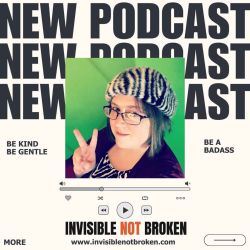
Tech and Disability: What VR Offers the Disabled Community with Sunny Ammerman
01:10:27Monica Michelle is joined by artist and disability advocate Sunny AmmermanSunny lives with Septo-optic dysplasia, panhypopituitarism, Optic Nerve Hypoplasia, and is missing a membrane in the brain called the "septum pellucidum".In this episode, Monica and Sunny discuss: Sunny’s complex disorders and how she copes with themEverything VR provides from accessible gaming, social platforms and the potential for better online education.Various VR/AR games and their gameplay Sunny’s VR support groupTIMESTAMPS00:45 - What VR/AR offers for chronically ill and disabled folks11:57 - Sunny’s conditions and how she copes with them17:55 - Features that make VR games accessible or inaccessible as well as different games and their play experiences37:13 - The social aspects of virtual gaming51:32 - What opportunities VR has for the future1:04:49 - Sunny’s VR support group The full transcript and all links mentioned can be found on the episode page on invisiblenotbroken.com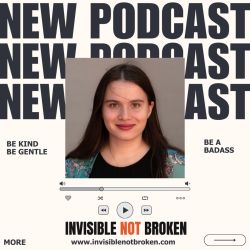
Reporting on Chronic Illness and Disability with Journalist Julia Metraux
39:16Monica Michelle is joined by Journalist Julia Metraux.Julia lives with vasculitis, mild to moderate hearing loss, and has experienced long COVID.In this episode, Monica and Julia discuss: Julia's diagnosis with vasculitis and how it influences her journalistic lensHow community impacts the mental health of those with chronic illnessHow Julia and Monica find positives and negatives in the internet spaces for chronically ill and disabled folksThe politics of how government, businesses, and celebrities influence the chronic illness community TIMESTAMPS00:32 - Julia's diagnostic journey07:02 - Julia’s work reporting on the online community of chronic illness 16:32 - The effect of Internet communities on chronically ill and disabled folks26:46 - How Julia’s illness impacts her work, both in what she writes about and how she manages her lifestyleThe full transcript and all links mentioned can be found on the episode page on invisiblenotbroken.com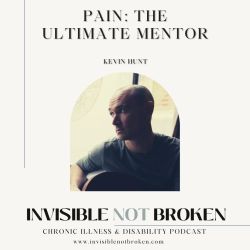
Author of “Pain: The Ultimate Mentor,” Physiotherapist Kevin Hunt
31:29Monica Michelle is joined by author & physiotherapist Kevin Hunt.Kevin lives with chronic pain.In this episode, Monica and Kevin discuss: Kevin’s philosophy of pain management as a physiotherapist who experiences chronic pain. The Hexagon Model, a life-management tool for focusing on what’s important to you.Kevin’s idea behind his new book.Using pain as a guide.TIMESTAMPS00:34 - Kevin’s work as a physiotherapist specializing in the experience of pain 06:44 - The Hexagon Model for managing your life’s needs14:00 - Putting aside the idea of a “quick fix”19:45 - Kevin’s personal experience with pain and how he uses it with patients28:44 - Kevin’s book, “Pain: The Ultimate Mentor”The full transcript and all links mentioned can be found on the episode page on invisiblenotbroken.com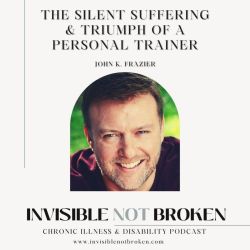
Author of “Through the Pain: The Silent Suffering & Triumph of a Personal Trainer”: John K. Frazier
28:35Monica Michelle is joined by author & personal trainer John K. Frazier.John lives with ankylosing spondylitis.In this episode, Monica and John discuss: John’s work as a physical trainer and authorChronic pain comparisonsPersonal triumphTIMESTAMPS00:50 - John’s business & diagnosis07:19 - Chronic pain olympics09:31 - Talking about & hiding a diagnosis15:09 - Personal triumph18:24 - Staying in the present23:29 - The superman complexThe full transcript and all links mentioned can be found on the episode page on invisiblenotbroken.com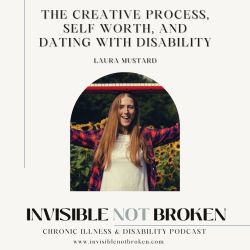
The Creative Process, Self Worth, and Dating with Disability: Laura Mustard
31:08Monica Michelle is joined by musician Laura Mustard.Laura lives with VATER syndrome.In this episode, Monica and Laura discuss: Laura’s inspiration for her upcoming musical EP.How Laura’s illness impacted her recent relationship & self-image.Laura’s creative process, new music, and social media pressure.TIMESTAMPS00:30 - Laura’s new EP / Monica’s recent COVID experience05:32 - Relationships with chronic illness11:20 - Image and self acceptance with disability15:32 - Laura’s creative process and current projects20:05 - Pursuing creativity despite social media attentionThe full transcript and all links mentioned can be found on the episode page on invisiblenotbroken.com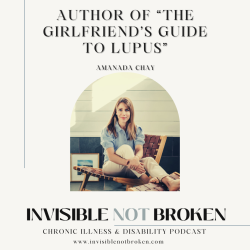
Author of “The Girlfriend’s Guide to Lupus”: Amanda Chay
30:43Monica Michelle is joined by author Amanda Chay.Amanda lives with Sjögren’s and Lupus.In this episode, Monica and Amanda discuss: Amanda’s book & diagnosisOutlooking on work & writingNavigating chronic illness with kids & familyTIMESTAMPS00:26 - Intro + The Girlfriend’s Guide to Lupus02:17 - Amanda’s diagnosis10:09 - Amanda’s outlook on writing17:11 - Navigating chronic illness with kids & family23:29 - Labels and roles26:24 - Flare reads & closing remarksThe full transcript and all links mentioned can be found on the episode page on invisiblenotbroken.com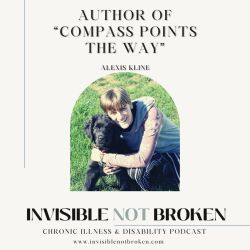
Author of “Compass Points the Way”: Alexis Kline
23:14Monica Michelle is joined by author Alexis Kline.Alexis lives with Dysautonomia.In this episode, Monica and Alexis discuss: Being a sick teenagerHaving an isolated diagnosisProductivity workflowsTIMESTAMPS00:28 - Alexis’s diagnosis & dog07:18 - Sick teenager road map10:00 - Alexis’s book & workflow16:25 - Having an isolated diagnosis20:50 - Wildlife photography, purchases The full transcript and all links mentioned can be found on the episode page on invisiblenotbroken.com
Author of “From the Sidelines to the Finish Line”: Emily Falcon
36:47Monica Michelle is joined by author Emily Falcon.Emily lives with ALCAPA.In this episode, Monica and Emily discuss: Growing up sickPost-surgery supportHaving a public bodySelf-motivation and adventuringTIMESTAMPS00:28 - Being a sick kid & Emily’s book title07:28 - Mortality10:16 - Portrayal of disability in media12:21 - Post-surgery support19:23 - Having a public body23:43 - Self-motivation29:46 - Emily’s tips for adventuresThe full transcript and all links mentioned can be found on the episode page on invisiblenotbroken.com